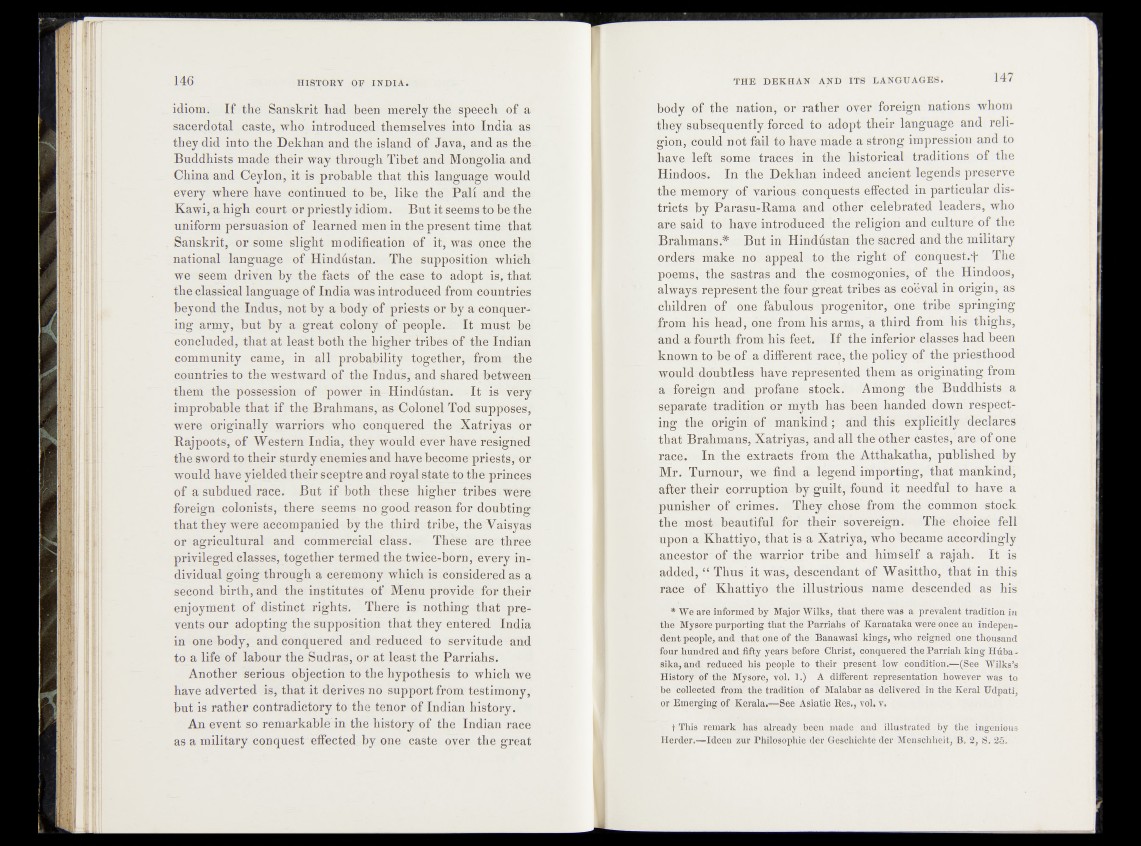
idiom. If the Sanskrit had been merely the speech of a
sacerdotal caste, who introduced themselves into India as
they did into the Dekhan and the island of Java, and as the
Buddhists made their way through Tibet and Mongolia and
China and Ceylon, it is probable that this language would
every where have continued to be, like the Pall and the
Kawi, a high court or priestly idiom. But it seems to be the
uniform persuasion of learned men in the present time that
Sanskrit, or some slight m odification of it; was once the
national language of Hindustan. The supposition which
we seem driven by the facts of the case to adopt is, that
the classical language of India was introduced from countries
beyond the Indus, not by a body of priests or by a conquering
army, but by a great colony of people- It
concluded, that at least both the higher tribes of the Indian
community came, in all probability together, from the
countries to the westward of the Indus, and shared between
them the possession of power, im Hindustan. It is very
improbable that if the Brahmans, as Colonel Tod supposes,'
were originally warriors who conquered the Xatriyas or
Rajpoots, of Western India, they would ever have resigned
the sword to their sturdy enemies and have become priests, or
would have yielded their sceptre and royal stated© the princes
of a subdued race. But if both thes'e; higher tribes were
foreign colonists, there seems no good reason for doubting
that they were accompanied by the third tribes the Taisyas
or agricultural and commercial class. Thete are; three
privileged classes, together termed the.twice-born, every individual
going through a ceremony which is considered as a
second birth, and the institutes of Menu provide for their
enjoyment of distinct rights. There is nothing that prevents
our adopting the supposition that they entered India
in one body, and conquered and reduced to servitude and
to a life of labour the Sudras, or at least the Parriahs.
Another serious objection to the hypothesis to which we
have adverted is, that it derives no support from testimony,
but is rather contradictory to the tenor of Indian history.
An event so remarkable in the history of the Indian race
as a military conquest effected by one caste over the great
body of the nation, or rather over foreign nations whom
they su-bsequenffyvforced to adopt their language and religion,
could not fail to have made a strong impression and to
have left some traces in the historical traditions of the
Hindoos. In the Dekhan indeed ancient legends preserve
the memory of -various^onquests^effected in particular districts
by Parasu-Rama and other celebrated leaders, who
are said to have instroducediithe- religion and culture of the
Brahmans.* But in Hindustan the sacred and the military
orders make no* -, appeal-Kto the'right of conquest.^ The
poems, the sastras and the cosmogohies/ of tlie Hindoos,
always represent the four great-tribes as coeval in origin, as
-children of one fabulous progenitor, one tribe springing
from his head, one from his arms, a third from^hjs thighs,
and a fourth from! h i & Teat.4 If fke> infer iorvcjlpjfes es had been
known to -be ©fia different race, th^pokey^qf the priesthood
would doubtless havé*represented them as originating from
a foreign and profane*'stpctet Among-'the Buddhists a
separate tradition or myth has be’qh? handed' down respect^
ing. îthe origin*,-of mankind ; dud this explicitly déclares
t%at~ Brahmans, Xatriyas, and all the ëtheAèàsées, ; are of one
nace. In the extracts from 4he Atthakatha, published by
Mr. Tumour, we find à legend importing; 4that mankind}'
after their corruption by guilt, founds it needful to have a
punisher of crimes. Theycchose* from the common stock
the most beautiful for their so&ereignv Thtstehoice fell
ü p i||h Khattiyo, that is a Xatriya/wh© became accordingly
ancestor“of the warrior tribe and himself a rajah. It is
added, “ Thus it was, descendant ©f Wasiltl^l that iü; this
race of Khattiyo* 4ke; illustrious .name descended as bis
* We are informed, by Mg] or Wifics, that there was ai prevalent tradition in
the Mysore purporting that the Parriahs of Karnataka were once an independent
people, and that one of the Banawasi kings, who reigned one thousand
four hundred and fifty years before ChrisJ:; j.conxpxered'the^Parriah king Huba-
sika, and reduced his people to ttiür.,preséntéloVf condition.—(See Wilks’s
History of thewÏIysore, vol. different representation however was to
be collected from thè traditioii of Malabar as delivered in the Keral Udpatl,
or Emerging of Kerala.—See Asiatic Res., vol. v* C *
• t This remark has already : héén made and illustrated by the ingenious
Herder.—Ideen zur Philosophite^Üeï Geschicbte der Menschheit, "B. 2, S. 25.